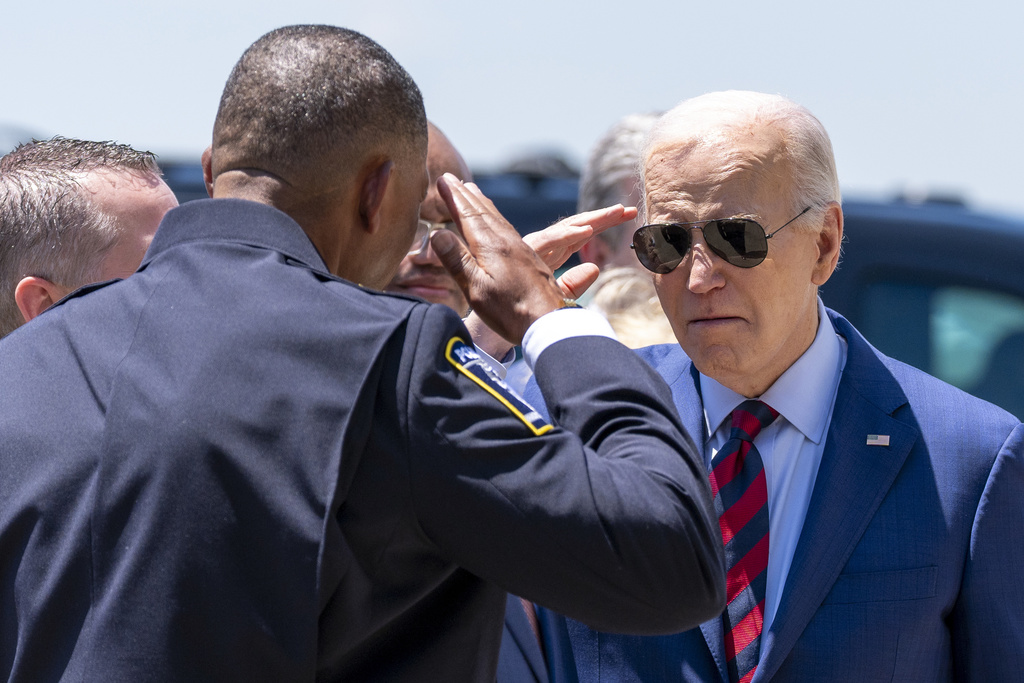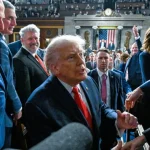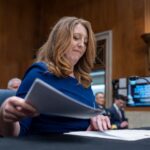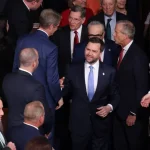

President Joe Biden met with the families of four slain law enforcement officers in Charlotte, North Carolina, on Thursday for nearly two hours, underlining the tightrope he’s walking on “law and order” ahead of the 2024 general election.
On Monday, North Carolina Department of Adult Corrections officers Sam Poloche and William Elliot, Charlotte-Mecklenburg officer Joshua Eyer, and deputy U.S. Marshal Thomas Weeks were attempting to serve warrants to Terry Clark Hughes Jr.
Hughes, 39, opened fire on the group, killing the aforementioned officers and wounding several others before being shot and killed himself.
The president was already scheduled to travel to the area Thursday to announce a series of steps aimed at removing lead pipes from communities across the country, and the White House added a meeting with the families of the slain officers to his trip. White House officials say that “the wounded law enforcement officers and their families, other law enforcement officers, and elected officials,” also took part in the meeting at Charlotte Douglas International Airport.
Biden was the sole 2020 Democratic presidential primary candidate to disavow the “defund the police” movement taking over progressive politics during the COVID-19 pandemic, yet he has still sustained heavy criticism from former President Donald Trump and other Republicans regarding elevated violent crime levels across much of his presidency.
Though violent crime started to creep back down to pre-coronavirus levels in most major cities beginning in 2022, the elevated crime rates in Washington, coupled with some recent public missteps on the part of the president, have kept Biden open to attacks on the matter.
On March 28, Biden visited New York City for a high-dollar fundraiser alongside former Presidents Barack Obama and Bill Clinton. That same day, however, Trump attended the wake of Jonathan Diller, a 31-year-old New York City Police officer fatally shot by a civilian during a routine traffic stop in Queens.
Following the wake, Trump held a press conference during which he insinuated that Biden cared more about fundraising than the police community.
“We have to get back to law and order,” he said at the time. “We have to do a lot of things differently. This is not working. This is happening too often.”
And just a few weeks later, Biden again angered some police groups by going through with a previously scheduled trip to Syracuse, New York, to tout public-private investments garnered through his CHIPS and Science Act, just days after that community saw two of its own officers killed in the line of duty.
Biden did meet with the families of the slain Syracuse officers, and he opened his remarks that day by honoring the fallen heroes and recalling his own personal history of familial loss.
“You’ve lost a part of your soul,” he told the crowd. “The entire Syracuse community is grieving, and we’re grieving with you. To the men and women in law enforcement, here and across the country, you represent the best of us.”
However, Biden risks alienating a portion of his winning 2020 coalition if he leans in too hard to back law enforcement. That dilemma has been on clear display over the past two weeks, as the White House has largely avoided questions about attempts to crack down on escalating violence at pro-Palestinian protests taking place on college campuses across the country.
Biden finally addressed the protests Thursday morning after law enforcement officials began forcibly clearing protesters out of some of the campus encampments.
CLICK HERE TO READ MORE FROM THE WASHINGTON EXAMINER
The president specifically said that he respected activists’ constitutional right to peacefully protest but forcefully condemned the escalating violence.
Still, asked if he was considering mobilizing National Guard resources to help reinstate “law and order,” as requested by many Republican lawmakers, the president simply responded, “No.”




